-
|
05 June 2022
|Posteado en : Interview
Indigenous peoples occupy 22% of the world's territory and their role is essential for the maintenance of cultural diversity and biodiversity, according to UNESCO.
The nature managed by these communities is declining less rapidly than in other areas, as they work to protect the environment over the long term through sustainable use of biodiversity management and governance. However, they are the most affected by the effects of climate change.
The lands they manage account for 28% of the carbon stored in forests globally. Annually, they sequester an amount of CO2 equivalent, on average, to 30% of Brazil, Colombia, Mexico and Peru’s 2030 targets. These countries store 28% of the world’s carbon, but account for only 5.1% of global greenhouse gas emissions.
The latest report of the Intergovernmental Panel on Climate Change (IPCC) warns of the loss of ecosystems and the decrease in food production and access to food, which has led to an increase in malnutrition and has seriously affected the economy of these indigenous communities.
Climate policies have traditionally ignored the ancestral knowledge and wisdom of indigenous peoples, which is why 141 governments committed at COP26 in Glasgow to recognise the rights of these communities and their lands as a fundamental element in ending deforestation by 2030. Now Peru is launching an Indigenous Peoples’ Platform to address climate change.
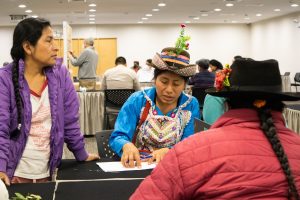
It thus becomes a pioneer country in the recognition of indigenous knowledge and practices that contribute to the comprehensive management of climate change, as established in the Paris Agreement.
FIIAPP supports this Platform
We spoke with Teresa Aguilar and Álvaro Ovejas, Project Technicians in the European programme Euroclima+, co-led by the FIIAPP, which has supported the formation of this Platform. They tell us about the challenges in the implementation of this proposal and the great benefits it brings. This is the first time that the Peruvian Ministries of Culture and Environment have come together with the country’s indigenous peoples.
How was the Platform of Indigenous Peoples of Peru born to confront climate change?
Teresa: This Platform was born out of the indigenous people’s own demand and brings together the seven registered and legalised indigenous organisations in the country. It is a milestone on the Latin American continent because it brings together indigenous peoples of different casuistry, ethnicities and origins.
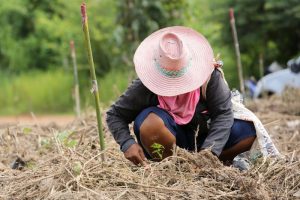
Álvaro: The Platform gives indigenous peoples a voice in climate governance bodies, such as the National Commission. In addition, Peru is a ratifier of ILO Convention 169, which establishes the obligation to consult indigenous peoples in all political and legal measures that could directly affect them.
What have been the main challenges in setting up this platform?
Teresa: The first challenge has been linguistic. The different indigenous peoples cannot understand each other, because not everyone speaks Spanish, only the political leaders. They speak five native languages such as Quechua, Aymara, Shipibo and Awajún. We have also faced the territorial challenge. It is not easy to move around in a country like Peru, and these are people who do not have access to digitalisation either.
How does climate change affect indigenous women the most?
Teresa: The indigenous population, because of their origin, is a rural population and their livelihoods depend on natural resources. Therefore, climate change directly affects their economic activity.
The impact of climate change is aggravated and is more disproportionate for women, who are already discriminated against and vulnerable. They are socially responsible for food and household health and, living in rural environments, their livelihoods are based on fishing, livestock, agriculture or agroforestry management. The impact of climate change degrades their economy, and we are already seeing climate migration in the face of environmental disasters caused by climate change.
What has been the role of the European programme Euroclima and the FIIAPP in the construction of the Platform?
Álvaro: Euroclima has been involved from the beginning of this process. It started with the prior consultation with indigenous peoples on the Framework Law on Climate Change, which agreed, among other provisions, on the creation of this Platform. It was during the development of the Framework Law on Climate Change that direct collaboration between Euroclima and the Peruvian Ministry of Environment began.
On the one hand, we have supported the development of dialogues between the Peruvian Ministry of Environment and national organisations. And on the other hand, we have supported the process of creating the entire legal, regulatory and institutional framework that gives the Platform its place.
Why are indigenous peoples known as guardians of diversity?
Álvaro: The way of life of indigenous peoples is not only very rural, but does not require the same infrastructure that is used in cities. Their routine is much more adapted to the environment.
Teresa: I think that the guardians of nature are undoubtedly the people who have originally grown up and lived in it. It is their ecosystem and they know it perfectly, it is what is called ancestral knowledge.
Is this initiative in Peru a reference for other Latin American countries?
Teresa: Peru is now a country that others look up to. There are countries that could replicate it because the Peruvian experience is scalable. All of Latin America has an indigenous population, but political will is needed. It all depends on the nature of the country and how this indigenous figure is received by governments.
There is also talk of indigenous associations at the regional level, such as those in the Amazon. The Amazon Basin has great value in terms of forests and the environment; it is the lungs of the planet and touches several countries. Therefore, we are no longer talking about a national platform, but a transnational one. When you talk to regional indigenous associations, their dream is to have a platform that unites them at the regional level.
-
|
08 September 2020
|Posteado en : Opinion
On World Development Worker Day, a FIIAPP technician tells us about the challenge faced by millions of people in accessing drinking water
On World Development Worker Day, David Rodríguez Soane shares his thoughts with us on the importance of development workers continuing with their work. A vital and necessary task, especially during the pandemic. In a difficult context like this, David focuses on the need to guarantee access to safe water and hygiene, as universal rights and a key action against the spread of the virus.
Washing your hands with soap and water is a simple gesture that today more than ever, in the middle of the Covid era, helps save lives. With the first days of September already passing by, governments and educational centres are debating about reopening their facilities and the most appropriate teaching models to adapt during this pandemic. However, in 43% of schools around the world it is not possible to wash your hands, a key defence mechanism in the fight to reduce the transmission of the virus. In fact, in less developed countries, 7 out of 10 schools lack basic facilities.
In mid-August, the World Health Organization (WHO) and UNICEF published a joint report, Progress on Drinking Water, Sanitation and Hygiene in Schools (WASH), in which it was revealed that around 818 million children in the world lack basic facilities to wash their hands in their schools, which puts them at greater risk of contracting Covid-19 and other communicable diseases. More than a third (295 million) live in Sub-Saharan Africa.
Once again, water proves essential for life. But so are sanitation and hygiene. A simple example is enough: without toilets, natural water sources are polluted; without clean water, basic hygiene practices are not possible. Among them, washing your hands.
The cooperation perspective
The world of cooperation has an important role to play in ensuring that the right to drinking water and sanitation is just that, a right for everyone. Indeed, this summer, the international community discussed water at great length. In the last week of August, for example, numerous actors, from governments to civil society organisations, gathered at two important events.
On the one hand, from 24 to 28 August, Water World Week – WWWeek took place virtually. The Stockholm International Water Institute (SIWI) promotes this multilateral Agora every year which, for almost 30 years, has become the most influential event in the world for tackling the greatest challenges relating to water. On the other hand and also in the same week, the German Agency for International Cooperation (GIZ) organised five days of conferences dedicated exclusively to water from the perspective of development. This year, the Week on Water for Development (WW4D) started with a motto which is clearly part of today’s world: “Every drop counts, water in exceptional times.”
Also this summer, in July, and with a strong presence from Spanish Cooperation through the Cooperation Fund for Water and Sanitation (FCAS), the XXI Conference of Ibero-American Water Directors (CODIA) took place, which is the main platform for political dialogue, technical collaboration and cooperation on water in Ibero-America. Within this framework, the two technical dialogues that dominated the debate were the relationship between water and biodiversity and the integration of sanitation and treatment in the framework of integrated water resources management.
As we can see, there are plenty of spaces for the exchange of experiences and for multi-stakeholder coordination in order to achieve SDG 6, clean water and sanitation for all. The achievements of the past should serve as a spur to strengthen the firm steps being taken by multilateralism to reach 2030 in the best possible position. Global mobilisation after the Millennium Development Goals (MDGs) lead to the fact that in 2015, 2.1 billion people had access to improved sanitation and that 147 countries reached the goal for accessing sources of drinking water (MDG Report 2015, UNDP). Now, the SDGs, after being with us for five years, open a new window of opportunity to follow the same path of progress and consolidation of rights. However, the figures in the SDG Report 2020 on SDG6 are not as good as one would expect and the emergence of Covid-19 has only made the situation worse. This is why we require solutions, we need answers.
In this context, Spanish Cooperation, has the tools to contribute to global objectives and these must be emphasised. From data for 2018, it has been estimated that the FCAS has benefited more than 2.8 million people in Latin America and the Caribbean. In addition, 2.2 million Latin Americans have had access to new or rehabilitated drinking water services and 1.1 million to sanitation services. Also the AECID and FIIAPP, through its participation in the EUROCLIMA+ project, which is the EU’s flagship programme on environmental sustainability and climate change with Latin America, devote enormous efforts to managing water in order to ensure the availability of water resources and strengthen institutional capacities and governance of the sector in beneficiary countries. In turn, numerous NGDOs, such as Manos Unidas, Oxfam Intermón and Acción Contra el Hambre, to name just a few, also carry out important specialised intervention actions regarding the provision of water, sanitation and hygiene in the countries in which they operate. They are examples of actors in our development work, but there are more, also among the autonomous communities, universities and other agents that are part of the system.
Thoughts from the pandemic
We have been looking at the issue from the perspective of cooperation, but the pandemic that has taken up and conditioned our lives for months provides us with some thoughts: the interconnection of essential elements such as dignity, people, prosperity, the planet, justice and partnerships. We are already familiar with the image being reflected back at us, but it also invites us to reflect once again. Global health, quality education and access to water and sanitation. SDGs 3, 4 and 6. All of these are interconnected rights, objectives and challenges that intersect throughout the world in a familiar scene in early September: the beginning of the school year. The equation is more complex in times of pandemic. And practically impossible to solve, for those girls and boys living in countries where washing their hands with soap and water is still a luxury within the reach of only a handful of people.
On 8 September each year we celebrate Development Worker Day. It is a day to honour all the people who contribute their work, their knowledge and their sweat to build a world which is more just. But it will also be a day to remember that, according to the Hand Hygiene For All initiative, three billion people, 40% of the world’s population, cannot wash their hands with soap and water at home. Three-quarters of them live in the poorest countries in the world. Simply because they lack basic facilities to wash their hands, millions of people are at immediate risk of contracting Covid-19 or other diseases.
The challenge is enormous, but we must make a start at sometime and in some place. So let’s start this September and let’s start with schools. Let’s learn a lesson as a society: simple gestures should not be impossible.
Author: David R. Seoane, Communication and Knowledge Management Technician for the Spanish Cooperation programme “Transparency, Communication and Knowledge Management”
-
|
26 March 2020
|Posteado en : Reportage
We commemorate World Meteorological Day, which is held on 23 March and which highlights the relationship between meteorology and climate change and the work of EUROCLIMA+ in this regard
Torrential rain and droughts are water-related meteorological phenomena, all increasingly extreme anywhere on the planet. This year, World Meteorological Day, under the heading of “climate and water”, is dedicated to these and other similar phenomena and focuses on the climate change effects which manifest themselves through water.
According to data from the World Meteorological Organisation (WMO), humans cannot survive more than three days without water and there are currently 3 billion people worldwide who do not have basic facilities to wash their hands. Furthermore, knowing this, it must be taken into account that in the next 30 years the world demand for fresh water will increase between 20% and 30%.
With the aim of commemorating the creation of the WMO on 23 March 1950 within the UN, this day also serves to highlight the contribution made by National Meteorological and Hydrological Services (NMHSs) to the security and well-being of societies; and, why not, to reflect on the importance of meteorology in the global context of climate change in which we live today.
Water, a shared asset
Extreme meteorological phenomena, the result of the climate change we all experiencing worldwide, are one of the greatest global threats. Specifically, those related to water pose a major risk due to their impacts both on sustainable development and on people’s safety. According to the WMO Secretary General, Petteri Taalas, in the organisation’s statement about 23 March, “The changes in the global distribution of rainfall are having important repercussions in many countries. Sea levels are rising at an ever-increasing rate due to the melting of larger glaciers, such as those in Greenland and Antarctica. This is exposing coastal areas and islands to an increased risk of flooding and the submergence of low-lying areas.”
Rising rivers or floods are a source of peace and conflict, as most rivers and other freshwater areas cross borders, and decisions made by one country regarding the management of water resources often have an impact on other countries. In addition, food security is closely related to water: for example, the concentration of rainfall at certain times of the year or in certain places affects agriculture, movements and, ultimately, the survival of millions of people all around the world.
Ample evidence of the chosen heading’s international significance is to be found in the fact that water and climate are the cornerstones of Sustainable Development Goal 6 (Clean water and sanitation) and 13 (Climate action), both included in the 2030 Agenda for sustainable development, which contain the global priorities for the next 10 years.
Every drop counts for the EUROCLIMA+ project
As expressly detailed by the WMO, data on water resources are currently incomplete and scattered, which greatly hinders joint work between countries and international cooperation to face global challenges, such as climate change.
The EUROCLIMA+ project is working along these lines, hand in hand with AEMET in Central America, where, together with the different countries’ institutions, they are generating climate scenarios to anticipate the impacts of climate change and plan adaptation measures. In this sense, the project, financed by the EU and with the FIIAPP participating in the management, has its sights set on reviewing the impact, vulnerability and needs of adapting to climate change.
The usefulness of the scenarios, in the words of the project specialist and AEMET meteorologist Jorge Tamayo, depends on having information so as to know “what is going to happen and what measures can be applied”, and also that such information can “be used by those responsible for water management, for planning”, for example “if they have to make a greater number of reservoirs or have to resize those that they currently have, to try to mitigate these effects at least by knowing them.”
Working together to adapt or mitigate climate change is the same as working together for a more resilient future, as EUROCLIMA+ demonstrates.
-
|
20 September 2018
|Posteado en : Interview
Alexandra Cortés, expert in Communication and Visibility of EUROCLIMA+, tells us what the keys of the programme against climate change in Latin America are
What is EUROCLIMA+?
EUROCLIMA+ is a programme funded by the European Union offering a wide range of specialized services aimed at supporting the implementation of the commitments of the Paris Agreement in the field of climate governance, as well as the funding and technical assistance for the execution of projects with Latin American countries.
The implementation of these projects is carried out through the synergistic work of cooperation agencies of member countries of the European Union, together with two agencies of the United Nations ( UN ).
What are the objectives of the programme?
The programme seeks to promote environmentally sustainable development in 18 countries in Latin America, in particular, for the benefit of the most vulnerable populations. In addition, it supports countries in the implementation of the commitments established through the Paris Agreement on climate change.
What does each of the agencies that manage the programme do?
The spectrum of topics covered by EUROCLIMA+ includes the main development areas that are part of the climate change agenda. These issues are driven by the vast experience of the agencies implementing the programme, selected on the basis of their experience in the field of climate change, the environment and sustainable development in Latin America.
One or several agencies deal with each of the components of the programme. Therefore, the FIIAPP works on Climate Governance with the Economic Commission for Latin America ( ECLAC ), UN Environment and the German Society for International Cooperation ( GIZ ). The German agency also deals with the component of Forests, biodiversity and ecosystems, energy efficiency, together with Expertise France, for Resilient Food Production, also with the French institution, and Urban Mobility , with the French Agency for Development ( AFD ). The latter also works with the Spanish Agency for International Cooperation for Development ( AECID ) on the components of Energy Efficiency, Water Management from an Urban Perspective and Disaster Risk Management.
What does the joint work of all these institutions contribute?
The joint work of the different implementing agencies provides a broad and complementary experience in the field of climate change and sustainable development. It also promotes the exchange between Europe and Latin America, shortening distances and promoting synergies.
And the work of the FIIAPP in particular?
The FIIAPP leads the implementation of the Climate Governance component, accompanying the countries in the design, updating or implementation of climate policies. This will help Latin American countries reach 2020 with updated legislation and plans adapted to their realities.
Specifically, the Foundation facilitates dialogue on climate policies and provides technical and financial support for the development and implementation of policies, plans, measures and tools for adaptation and mitigation of climate change in Latin America. It works by directly supporting the governments of the different countries, with actions oriented at their strategic and direct demands designed jointly with the Latin American institutions within the framework of the EUROCLIMA+ programme.
According to the topics of greatest interest in the region and considering the context and the main challenges involved in facing up to climate change, the action lines of the component would be the implementation of NDCs, climate services, climate financing, education, communication and participation, and gender.
The key tools at the service of the 18 participating Latin American countries are those of collaboration between institutions, the search for synergies, joint learning and the exchange of information and best practices. To this end, the horizontal component offers both European and Latin American experiences in this area. In addition, it strengthens the capacities of Public Administration personnel, as well as other persons involved, including civil society.
What are the challenges of EUROCLIMA+?
EUROCLIMA+ works in an innovative, intersectoral and multi-stakeholder environment. The initiatives are identified and planned through participatory mechanisms. It encourages dialogue and regional exchange, ensuring that Latin American countries share best practices and lessons learned.
The programme provides services to the governments of Latin America based on their needs, seeking to promote political dialogue, knowledge management, capacity development, education and awareness of climate change. EUROCLIMA+ is driven by demand. It brings together experiences from Europe and Latin America, as well as the experience of the specialized agencies of the United Nations, it supports South-South cooperation and joint learning processes.
Given this scenario, one of the main challenges of the Programme is precisely the synergistic work with 18 countries in Latin America, a region in which many strengths and needs are shared, while at the same time presenting great differences, marked by their history, culture, politics and interaction between the nations themselves.
-
|
31 May 2018
|Posteado en : Reportage
A number of projects managed by FIAPP are taking part in the European Development Days 2018, with gender equality as the overarching theme
“Women and Girls at the Forefront of Sustainable Development: protect, empower, invest” is the slogan chosen for the European Development Days 2018, which will be held next week in Brussels. On 5 and 6 June, the capital of Europe will also be the capital of development.
This is because, this year, the days organized by the European Commission have gender equality as their central theme. As well as promoting the participation of women in the various forums, this edition hopes to make this a safer, more open and more inclusive world for all of them.
The most important development event in the world, which is open to the public, will pack 500 meetings into two days, in which more than 2,600 speakers will take part. Among them will be 7 Nobel laureates and 100 world leaders. FIAPP will also be attending the European Development Days (EDD) to represent four of the projects that it manages: EUROsociAL+, Bridging the Gap, Triangular Cooperation and EUROCLIMA+.
The EUROsociAL+ programme promotes cooperation and dialogue between the European Union and Latin America on promoting public policies to improve social cohesion and reduce inequality in Latin America.
However, for Enrique Martínez, Communication technician for the programme, “these public policies are only effective when they attack the inequality gap between men and women, a challenge and a goal that are strongly etched into the EUROsociAL+ DNA”.
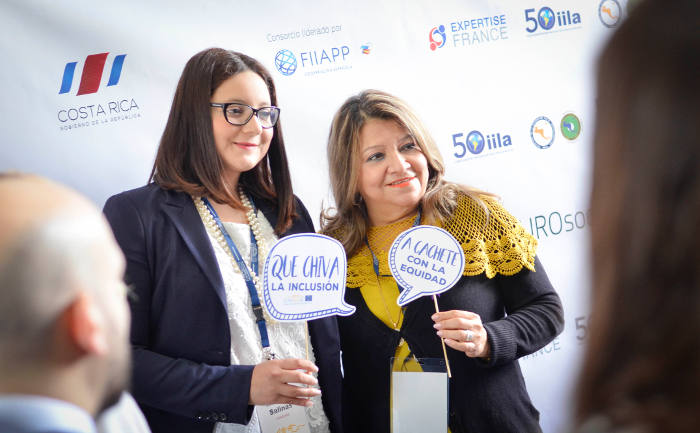
This is why, in Brussels, the programme is sharing three advances in gender equality policies, in Paraguay and Mexico and, at the regional level, in Latin America. In addition European transfer on this subject.
The executive director of the Social Cabinet of the Office of the President of Paraguay, Mirta Denis, the executive secretary of the Mexican Institute for Women, Marcela Eternod, the director of Fundación Género y Sociedad, Ana Isabel García Quesada, and the French State Counsellor, Marisol Touraine, make up “100% female EUROsociAL+ panel as a contribution to this collective journey to full equality”, said Martínez. In addition, the round table discussion will be opened and closed by Jolita Butkeviciene, Director for Latin America and the Caribbean at the European Commission Directorate General for International Cooperation and Development.
The Bridging the gap project is also taking part in the 2018 European Development Days, with a session on Women on the rise – no one left behind!, organized jointly by the EU Social Protection Systems Programme and the NGO Light for the World. This is the presentation video:
The aim of this session, according to Carmen Serrano, the project’s communications technician, is to “show that, in spite of the two-fold discrimination that disabled women face, they are spearheading sustainable development in low-income countries”. Four women will therefore share their experiences of gender and disability issues based on the different viewpoints tackled by the three viewpoints structuring the session: Social protection, leadership and entrepreneurship, and access to work and economic empowerment. It will be moderated by Hisayo Katsui, a researcher into and expert teacher on disabilities.
However, said Serrano, “The aim of presenting “Bridging the Gap” at this great European event is not just to share experiences but to create a dialogue and reflection on the role of women with disabilities in their communities”. This is why they have chosen to use the format of a Brainstorming lab. For 75 minutes, there will be constant interaction between the speakers and the audience so as to collect inputs and ideas on how everyone can create awareness among those around them of the contribution that women with disabilities can make to society.
The Evalúa project, which seeks to promote Public Policy Evaluation in Latin America and the Caribbean, will attend the EDD’s for the first time to talk about some of the results obtained since its inception in 2014.
The project coordination team will attend this international cooperation forum to present one of its most recent projects, the results of the evaluation of the Costa Rican Gender Equality Policy. Also, the management, led by the Ministry of Planning (MIDEPLAN) evaluation team, will be represented by Ericka Valerio, from the Evaluation and Monitoring department.
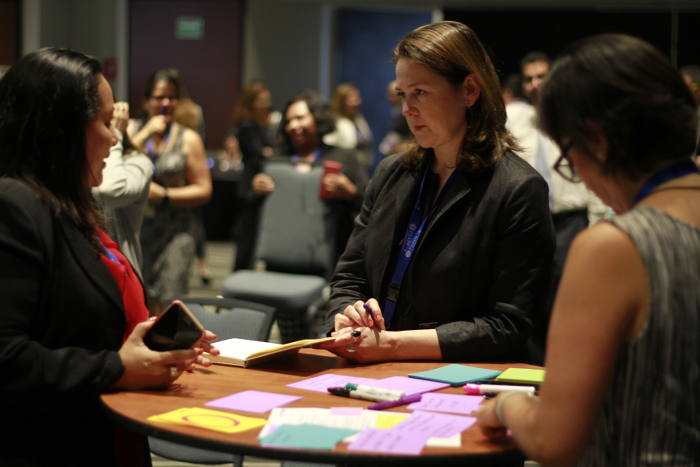
The project is part of the ADELANTE programme, which aims to improve integration in Latin American and Caribbean countries and to contribute to their reaching their development goals (SDG). The EDD will be an important place for presenting the major conclusions and recommendations of that public policy evaluation and the planned use of this evaluation as an input to the following stages.
According to Alina Orrico, a project technician, “It is especially important to take part in this event, in which there are much fewer Latin American experiences than from other continents and, above all, because it is taking place in a year filled with emotions, demands and allusions to the need to present tangible answers that will guarantee gender equality.”
EUROCLIMA+ is the European Commission’s regional programme to promote environmentally sustainable development in Latin America. This action benefits the most vulnerable population groups, focusing in particular on gender, the impoverished rural population and indigenous peoples.
During the event, a video will be projected on Gender and Climate Change and an information map of Latin America will be drawn using gender-related information.
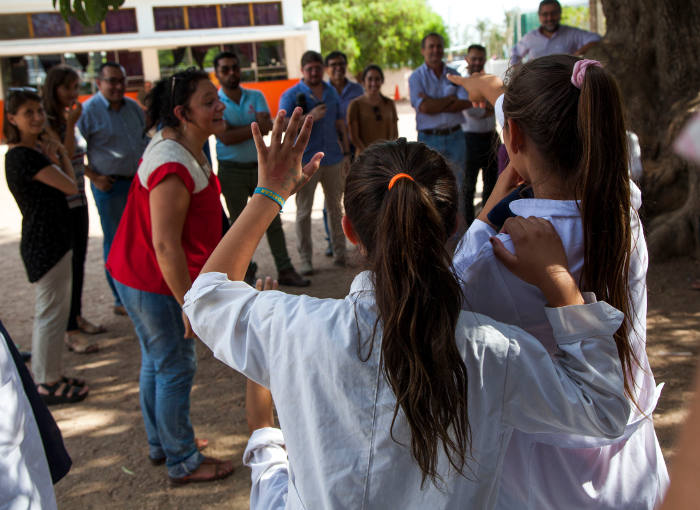
EUROCLIMA+ helps countries to develop their Nationally Determined Contributions or NDCs to the Paris Agreement. NDCs reflect the commitment of the international community to facing up to the effects of climate change.
According to Alexandra Cortés, an expert in Communication and Visibility for the programme, NDCs “promote the inclusion of climate action in a policy framework that can lead to economic growth and social development, in addition to protecting the environment and climatic resilience”.
-
|
15 February 2018
|Posteado en : Reportage
Cities are becoming key hubs from which to fight climate change. In Latin America, Euroclima+ supports mitigation policies to reduce emissions
When pollution levels increase, public transport in Paris is free. And only “clean” vehicles can enter the city. In Brussels and Copenhagen, priority is given to bicycles. Or the speed limit is reduced, as in Madrid. While London, Oslo and Stockholm use tolls to restrict traffic.
Other measures taken by the transport sector to reduce urban air pollution include prizes for green cars and controlling traffic flow and parking, encouraging car sharing and public transport. Urban air pollution is one of the most visible effects of climate change in cities around the world.
Outside of Europe, Tokyo monitors pollution in real time, with indexes that can be viewed online. Checks on the street, fines and lists of offenders are some of the other measures taken in one of the most populated cities in the world.
And the majority of the world population lives in cities. Making the adoption of an urban perspective on climate change necessary, as it is estimated that 70% of the population will be urban in 2050. Uses associated with the network of cities produce more than 70% of CO2 emissions.
Climate change and health
An article reflects on whether we are aware of what urban air pollution means. On whether we are aware that poor air quality affects our health. And on whether we are aware that it causes thousands of premature deaths a year. And it is backed up by data: 1,032,833 deaths per year in China, 621,138 in India, 54,507 in Ukraine, 32,668 in Turkey, 26,241 in Brazil, 26,160 in Germany and 16,798 in Mexico.
Euroclima+, the European Union-financed programme to tackle climate change in Latin America, supports the development of mitigation policies directly related to the reduction of greenhouse gases and other emissions.
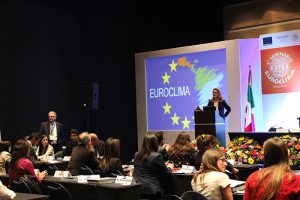
Euroclima+ meeting in Chile In addition, other specific plans with this objective are being developed in the industrial and transport sectors. They are necessary because a growing population means that current production and consumption patterns are running up against limited resources. A calculation of the ecological footprint shows that if no action is taken by 2030 we will need the equivalent of two planet Earths to cover our needs.
The programme is present in 18 Latin American countries and works in accordance with the United Nations Convention on Climate Change and according to the needs of a region that hosts some of those expanding cities.
Climate change in the Sustainable Development Goals
The climate governance component of Euroclima+ is being led by FIIAPP. Another of the programme’s tasks is to evaluate these climate policies, which will allow the associated actions to be redefined or redesigned in accordance with the framework agreements or compliance with the Sustainable Development Goals (SDG). These are the 17 goals several world leaders established in 2015 for a better world in 2030. And which, in summary, aim to “end poverty, fight inequality and stop climate change”.
Among them, number 11 refers to “sustainable cities” with a section on “environmental impacts” and number 13 focuses on action against climate change.–– But, how are things progressing with them?
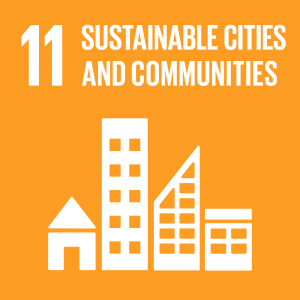
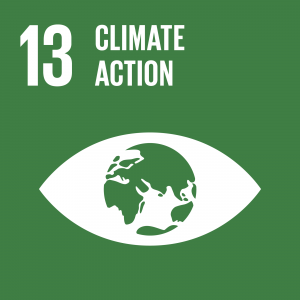
The European Union is studying progress towards these goals. In its latest study (Sustainable development in the European Union, 2017) it determined that the concentration of population and industry continues to be a risk for air quality. Despite the advances, the levels of air pollution continue to be above those recommended by the World Health Organization (WHO).
However, as part of its strategy for 2020, the EU set the goal of reducing greenhouse gas emissions by 20%, compared to 1990. The goal for 2015 has already been exceeded, with a reduction of 22%.
The cities are also commited
In this context, cities are aware they need to be involved. And they advocated this at the last UN Climate Summit (COP23), held in Bonn in November 2017, by calling for more tools to combat climate change.
Specifically, the reduction of greenhouse gas emissions was addressed with the ultimate aim of slowing down global warming. The objective remains that terrestrial temperatures do not increase more than 2 ºC by 2050. To achieve this, emissions must be reduced by 80%.
Euroclima+ also attended the meeting, where it met with ministers from several countries in the region to follow up on the objectives they have already committed to under the Paris Agreement (COP21) and to strengthen the dialogue on climate policies.
Many of the cities that met in Bonn also belong to the C40 network, which brings together more than 90 cities to combat the impacts of climate change by working collaboratively. The main objectives include “reducing greenhouse gases and increasing the health and well-being of citizens”.
This network alone represents “more than 650 million people and a quarter of the world economy”, making cities a priority when it comes to addressing this problem.
An example of this commitment is reflected in the short documentary released on the internet on the work of 6 cities: Bogota, Cape Town, New York, Paris, Portland and Seoul.
In reality, the next step is for us, as individuals, to also be aware that these measures are not intended to make our lives more difficult. On the contrary, they will allow us to live in the future.
The trick is to change some habits, with small gestures, however insignificant they may seem. More than 7,000 million small gestures can defeat climate change.




